The Toshiba RC100 SSD Review: Tiny Drive In A Big Market
by Billy Tallis on June 14, 2018 9:00 AM ESTMixed Random Performance
Our test of mixed random reads and writes covers mixes varying from pure reads to pure writes at 10% increments. Each mix is tested for up to 1 minute or 32GB of data transferred. The test is conducted with a queue depth of 4, and is limited to a 64GB span of the drive. In between each mix, the drive is given idle time of up to one minute so that the overall duty cycle is 50%.
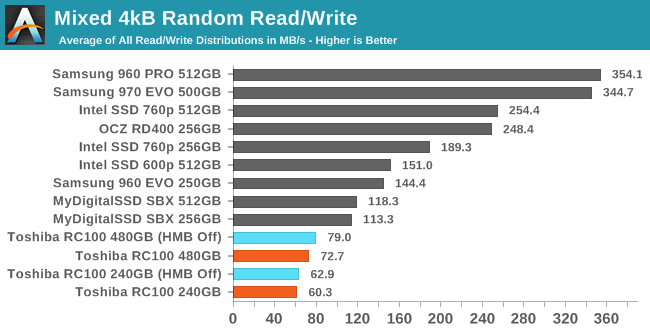
Mixed workloads are often the toughest for DRAMless SSDs, and with this mixed random I/O test covering 64GB of the drive, the Toshiba RC100's Host Memory Buffer is of little use. The RC100 is substantially slower than other NVMe drives on this test.
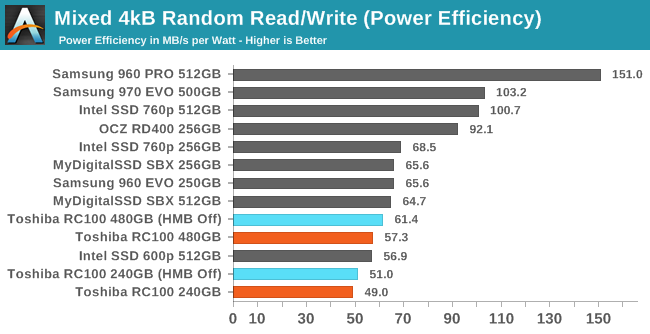 |
|||||||||
| Power Efficiency in MB/s/W | Average Power in W | ||||||||
Power efficiency from the RC100 during the mixed random I/O test is also poor, but it's not a significant outlier compared from the competition. Total power consumption is half a Watt lower than any of the other NVMe drives.
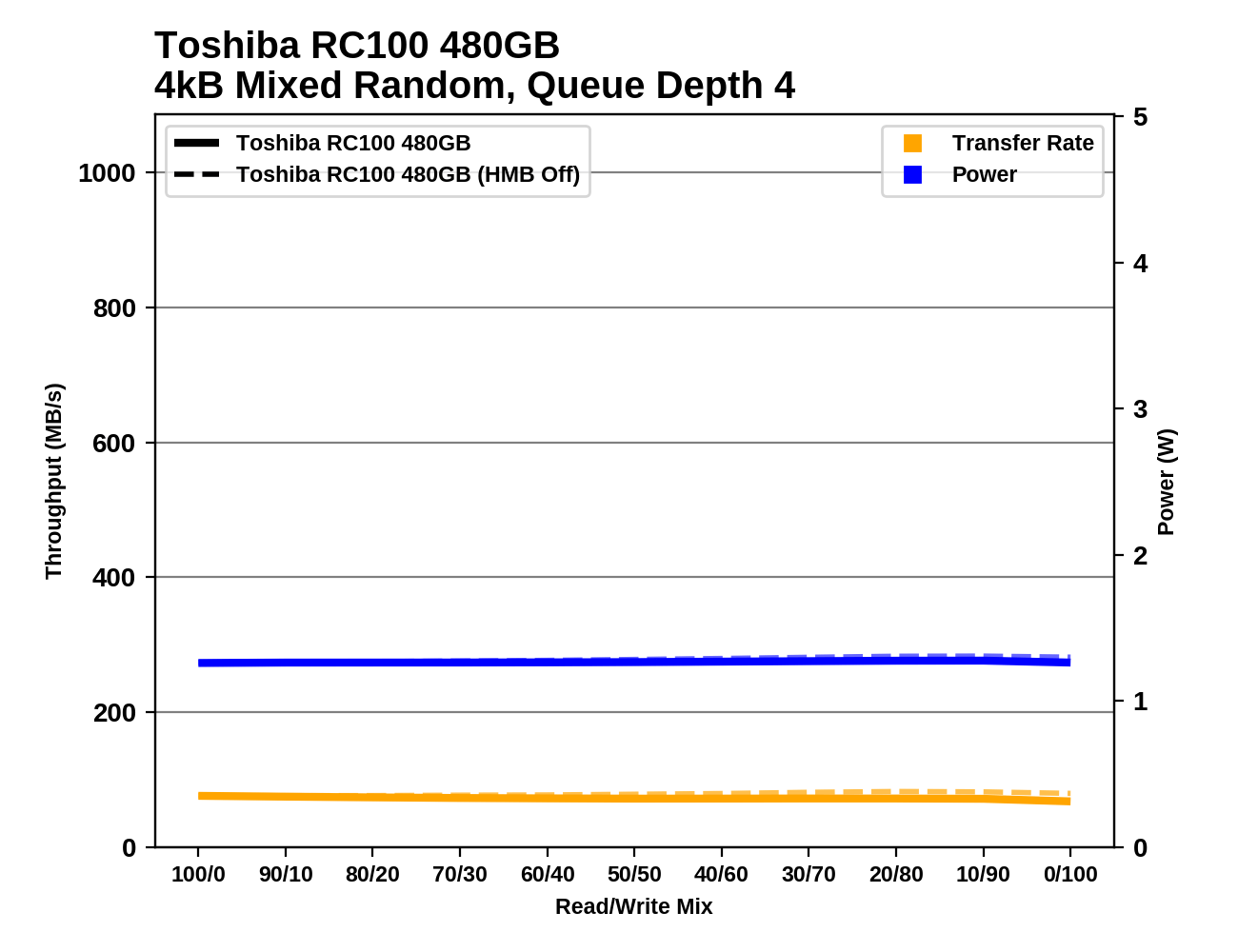 |
|||||||||
The performance and power consumption of the Toshiba RC100 are remarkably constant across the varying workload of this test. There's no sign of improved performance as the fraction of writes increases, which gives most SSDs the opportunity to perform more write combining.
Mixed Sequential Performance
Our test of mixed sequential reads and writes differs from the mixed random I/O test by performing 128kB sequential accesses rather than 4kB accesses at random locations, and the sequential test is conducted at queue depth 1. The range of mixes tested is the same, and the timing and limits on data transfers are also the same as above.
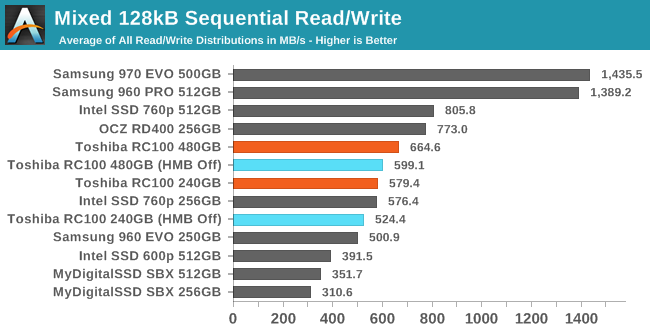
On the mixed sequential I/O test, the Toshiba RC100 is a decent performer with an average that exceeds what any SATA SSD is capable of. HMB is a bit of help here because the sequential access pattern is very cache-friendly even though the test spans a wider range of data than the cache can track.
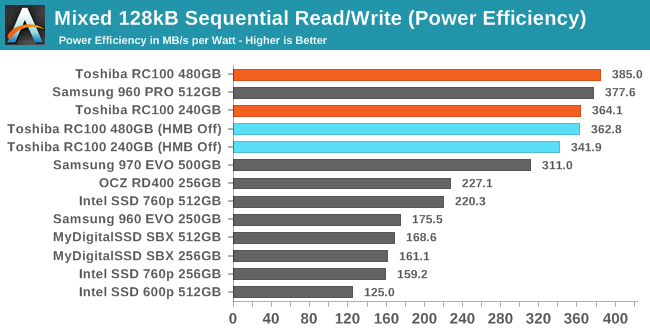 |
|||||||||
| Power Efficiency in MB/s/W | Average Power in W | ||||||||
The Toshiba RC100's power efficiency on the mixed sequential I/O test is great with or without HMB. The RC100 is clearly much slower than the high-end drives, but its power consumption is reduced proportionally.
 |
|||||||||
The performance and power consumption of the Toshiba RC100 are not quite as flat on the mixed sequential test as for the mixed random I/O test. The RC100 gets a bit faster as the workload shifts toward writes, and HMB becomes more beneficial with increasing write volume.










62 Comments
View All Comments
XabanakFanatik - Thursday, June 14, 2018 - link
Seriously? We get this instead of the 970 Pro or 905p review? Did anyone actually care about this drive?Billy Tallis - Thursday, June 14, 2018 - link
Personally, I find doing a review like this to be a lot more interesting than testing an overpriced flagship product where I know going into it that the conclusion will be that a drive 1/2 or 2/3 the price is just as good for realistic use cases. It's interesting to explore the current state of the art for high-end tech, but it's more interesting to explore new tech in the context of something that might also be a sane purchase.XabanakFanatik - Thursday, June 14, 2018 - link
I'm not sure how interest explains why you've reviewed this two days after it shipped but 7 weeks after you posted the 970 Evo review, there is no 970 pro review. Every other inferior review website posted the pro and evo reviews simultaneously, so Samsung must have sent you both drives around the same time.And Seriously, this is more interesting than reviewing the first optane refresh 905p?
close - Thursday, June 14, 2018 - link
They're usually very late with most reviews. Except Intel ones.Ostensibly because they want to provide the best information out there.
Samus - Thursday, June 14, 2018 - link
Need a review of a 970 Pro? Read the 970 Evo review and assume it’s moar better for proportionately moar money.bananaforscale - Monday, July 9, 2018 - link
Not proportionately. Flagship products *never* have a price that's proportional to performance.artifex - Thursday, June 14, 2018 - link
You already know a bazillion other sources for a 970 Evo review, so you're beating this guy up for being different? He says doing this review is more interesting for him, so no wonder he did it.Also, since you're calling Anandtech an inferior review site, he's hardly likely to change just for you, now.
XabanakFanatik - Thursday, June 14, 2018 - link
I was saying every other review site was inferior, yet they posted 970 PRO reviews the same time as 970 EVO reviews. My issue with Anandtech was the sole posting of the 970 EVO review and no 970 PRO review now for over 7 weeks.Nobody tests like Anandtech. I'm sad that the halo drives aren't a priority for Billy, since the market for them is actually really big.
lmcd - Thursday, June 14, 2018 - link
Most people I know look at the 970 EVO as the highest price drive they'll consider. I almost didn't even consider it.XabanakFanatik - Thursday, June 14, 2018 - link
I can think of a half dozen people I know that would have never considered the 900 Pro drive at the previous price point that bought one after Samsung's mysterious price drop at launch of the 970 series. Lopping off 20-25% of MSRP tends to work pretty well to sell a new generation that was previously priced too high.